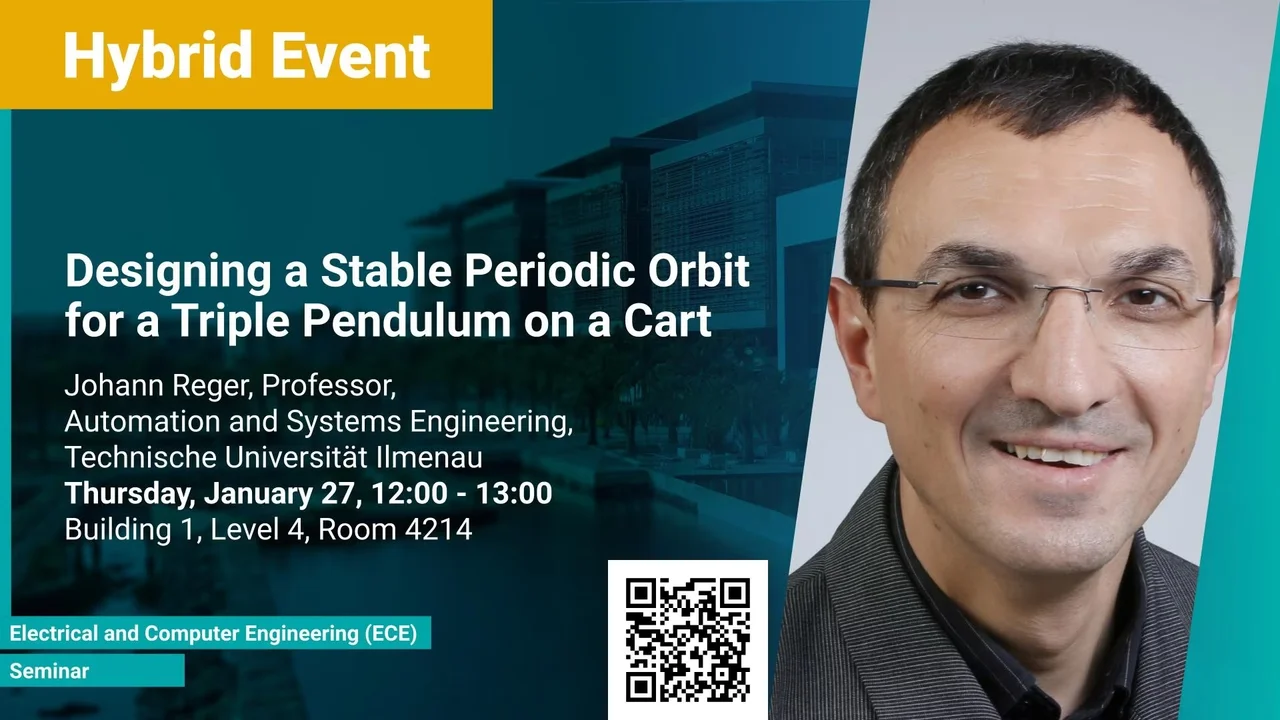
Designing a Stable Periodic Orbit for a Triple Pendulum on a Cart
- Prof. Johann Reger, Automation and Systems Engineering, Technische Universität Ilmenau
B1 L4 R4214
In this talk an inversion-based control approach is presented for the generation and stabilization of a periodic orbit in a multi-link triple pendulum on a cart. To this end, a nominal trajectory is generated by formulating the posture transition problem as a two-point Boundary Value Problem (BVP) in an input-output representation. For solvability of the BVP, a setup function is introduced such that additional parameters are provided in the differential equation of the internal dynamics. Based on the linearized dynamics about the nominal trajectory, a linear-quadratic-Gaussian controller is implemented to compensate for measurement noise, model uncertainties, and external disturbances. This way we force a triple pendulum to move along a non-trivial periodic orbit and render it attractive. The high performance and accuracy of our approach is illustrated on an experimental setup.
Overview
Abstract
In this talk an inversion-based control approach is presented for the generation and stabilization of a periodic orbit in a multi-link triple pendulum on a cart. To this end, a nominal trajectory is generated by formulating the posture transition problem as a two-point Boundary Value Problem (BVP) in an input-output representation. For solvability of the BVP, a setup function is introduced such that additional parameters are provided in the differential equation of the internal dynamics. Based on the linearized dynamics about the nominal trajectory, a linear-quadratic-Gaussian controller is implemented to compensate for measurement noise, model uncertainties, and external disturbances. This way we force a triple pendulum to move along a non-trivial periodic orbit and render it attractive. The high performance and accuracy of our approach is illustrated on an experimental setup.
Brief Biography
Dr. Johann Reger received his diploma degree (Dipl.-Ing.) in Mechanical Engineering in 1999 and his doctorate (Dr.-Ing.) in Control Engineering in 2004, both from the University of Erlangen-Nuremberg in Germany. He has held several postdoc positions, among others, with the Mechatronics Department at CINVESTAV-IPN in Mexico-City, the EECS Control Laboratory at the University of Michigan in Ann Arbor, and the Control Systems Group at TU Berlin. Since 2008 he is a full professor and head of the Control Engineering Group at the Computer Science and Automation Faculty, TU Ilmenau, in Germany. There he also serves as vice-dean and director of the Institute for Automation and Systems Engineering. His current research foci are on adaptive and robust control, variable structure and sliding mode control, state and parameter estimation. Application areas include robotics, mechatronics, automotive, and water systems.